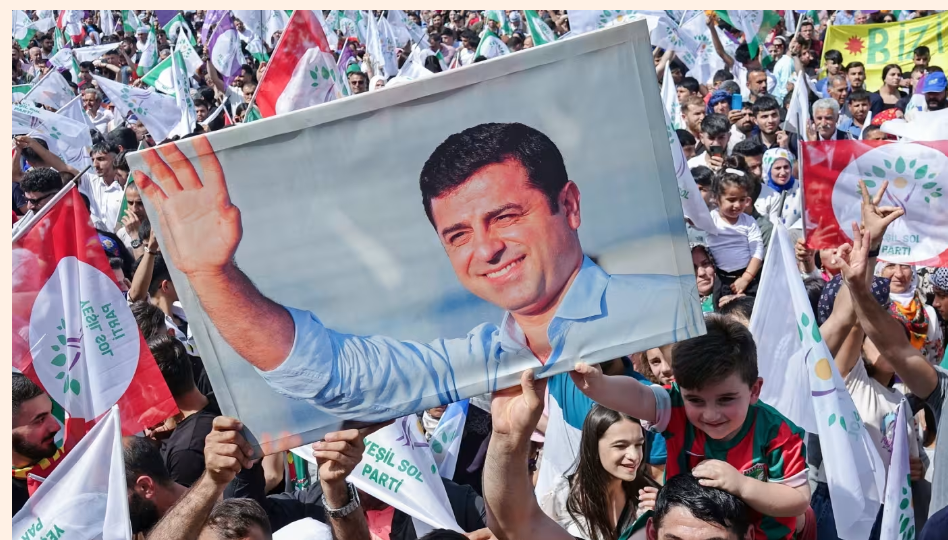A Turkish court on Thursday sentenced Selahattin Demirtas, the former leader of the pro-Kurdish People’s Democratic Party, or HDP, to 42 years in prison for his alleged role in deadly protests in 2014 that were triggered by an Islamic State attack on the Syrian Kurdish town of Kobani. His conviction, condemned by EU, Council of Europe with case pending final verdict in front of European Corut of Human Rights, also dimmed hopes of normalization in Turkish politics which Erdogan promised after his local election defeat.
Normalization alternatively refers to collaboration, reduction of polarization, inclusive polices and the like.
Another leading pro-Kurdish politician, Figen Yuksekdag, was sentenced to just over 30 years. Many other senior HDP figures were convicted among a total of 108 defendants charged with 29 offenses, including murder and harming the unity of the Turkish state, report DW Turkey.
At least 10 other defendants were acquitted of the charges against them. The politicians are expected to appeal the verdicts.
As the chief judge began to read the verdict, defense lawyers and observers in the courtroom at a prison complex on the outskirts of the capital Ankara banged on tables and chanted in Kurdish, “Long live the resistance of the HDP” and “Long live the resistance of Kobani.”
Demirtas has been in jail since November 2016 on terrorism-related charges. He remains one of Turkey’s most influential political figures. Demirtas and Yuksekdag were among 18 defendants already in jail.
Why did the protests happen in 2014?
Deadly riots in Turkey in 2014 were the result of a call by pro-Kurdish leaders in Turkey who were frustrated by what they perceived to be Turkish support for Islamic State group militants besieging the Syrian border town of Kobani.
Three days of clashes in October 2014 resulted in 37 deaths and hundreds of injuries, including police officers. The HDP blamed Turkish police for causing the deaths.
US-backed Syrian Kurdish fighters, who Turkey officially considers terrorists, drove the jihadists out of Kobani in January 2015.
In a testimony in 2023, Demirtas slammed the case as a “revenge” trial.
“There’s no single evidence about me. This is a case of political revenge, we were not legally arrested, we are all political hostages,” he said.
Ankara accuses the HDP of having ties to the militant Kurdistan Workers’ Party (PKK), which is listed as a terrorist group by Turkey, the United States and the European Union. The HDP denies any links to terrorism.
Faced with the prospect of closure, the HDP regrouped last year under the banner of the DEM party, the third largest in parliament.
A telegenic former lawyer who ran against Erdogan twice — the second time from jail — Demirtas has transformed his Peoples’ Democratic Party (HDP) into a mainstream force that makes up the third-largest voting bloc in parliament.
Called “Selocan” (my darling Selo) by his admirers and a “terrorist” by Erdogan, the 51-year-old was on Thursday sentenced to 42 years in prison over deadly 2014 protests instigated by the Islamic State group’s attack on the Syrian border town of Kobane.
Behind bars, he receives only rare visits, including from his wife Basak and two daughters.
He has used his time to become a prolific author, penning a novel and three other bestselling works.
Born in the Kurdish-majority southeastern city of Elazig, Demirtas was raised in a large and politically active Zaza family.
The Zaza are a Kurdish community with their own language, which is also used in parts of western Iran.
The trial was seen as part of Turkey’s crackdown on the Kurdish political movement after a peace process involving President Recep Tayyip Erdoğan’s government and the outlawed Kurdistan Workers’ party, or PKK, collapsed in 2015. Thousands of Kurdish activists have been jailed, adds Financial Times.
Tülay Hatımoğulları Oruç, DEM co-chair, accused the court of acting on behalf of Erdogan’s ruling Justice and Development party and its far-right partner.
Emma Sinclair-Webb, Turkey director for Human Rights Watch, said the prosecution of elected HDP officials and executives had deprived millions of voters of their democratic representation and violated the right to political speech.
She added: “It’s a political trial . . . The justice system is used as a blunt cudgel against oppositional voices in Turkey.
“While that continues, there can be no credible talk of a softening or an improvement in the general rights environment.”
Follow our English language YouTube videos @ REAL TURKEY: https://www.youtube.com/channel/UCKpFJB4GFiNkhmpVZQ_d9Rg
And content at Twitter: @AtillaEng
Facebook: Real Turkey Channel: https://www.facebook.com/realturkeychannel/
